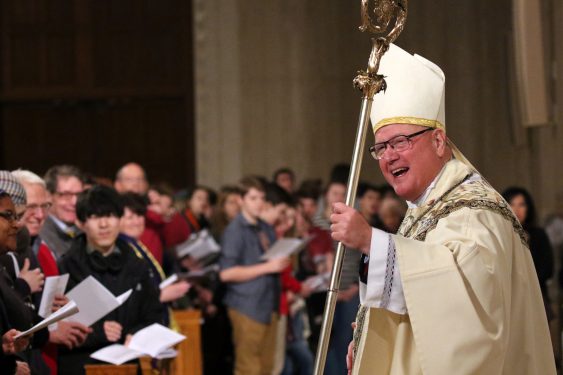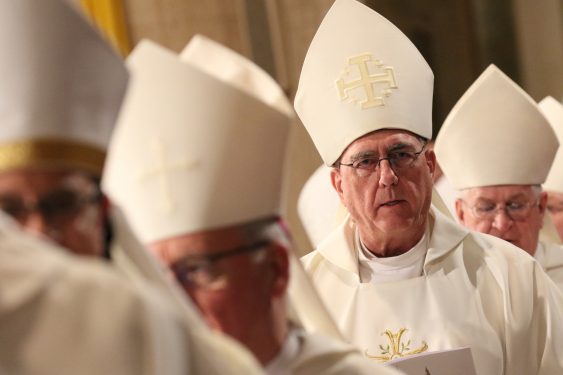By Christopher White, The Tablet’s National Correspondent

WASHINGTON, D.C. — As Cardinal Timothy Dolan of New York prepares to hand over the reins of the U.S. bishops’ pro-life committee to Archbishop Joseph Naumann of Kansas City, Kan., both men are in agreement that the pro-life work of the bishops’ conference serves as the cornerstone of its public policy work.
“It’s been a constant, consistent, and potent part of the bishops’ advocacy for a century,” Cardinal Dolan said on the eve of the March for Life, which draws tens of thousands of people to the nation’s capital each January to protest the Supreme Court’s decision in Roe v. Wade to legalize abortion.
He was elected in 2014 as head of the USCCB’s Pro-Life Activities committee – an appointment for a three-year term that commenced in November of 2015. Archbishop Naumann was elected at the fall assembly of the U.S. bishops in Baltimore, Md., last November and will succeed him later this year. Both men are longtime members on the committee and consider it among their defining ecclesial commitments.
As a historian by training, Cardinal Dolan explained that one of the particular joys of the past year was giving an address at the fall meeting of the U.S. bishops, which chronicled the body’s historical developments.
While researching their collective work, the New York prelate said he was pleased to discover that “the pro-life priority has been there from the beginning.”
He said that while a whole host of issues have been encompassed under the “chapter heading of the dignity of the human person and sacredness of human life,” it was Roe that marked a significant turning point.
“The Catholic Church’s teaching on the human person and the dignity of human life has been very strong in many, many ways and a lot of them under pro-life, such as the rights of immigrants, the needs of the poor, the security of people to have healthcare, housing, and jobs, and insurance,” said Cardinal Dolan.
“All of these things have now become part of the social justice beautiful tunic of the Church which became ramped up when the right to life of the most innocent, preborn baby in the womb was threatened in 1973,” he said.
For several decades now there has been an ongoing internal debate among Catholics on whether an elevated focus should be given to the issue of abortion when it comes to pro-life engagement, or whether the Church should opt for a “seamless garment” approach, which attempts to connect the dots between debates over abortion, capital punishment, euthanasia and the range of issues that are typically categorized as life issues.
Such an approach traces its roots to Cardinal Joseph Bernardin who in the 1980s famously argued for a “seamless garment” of life. During the 1990s and 2000s, this view largely found itself as the minority view within the conference. However, under Pope Francis, it’s been making a comeback.
The November 2017 election for Cardinal Dolan’s replacement as head of the pro-life committee was viewed by some observers as a referendum on which approach the bishops should adopt, with some seeing Archbishop Naumann as representative of the traditional approach and Cardinal Blase Cupich of Chicago, Ill., who was also on the ballot, as more representative of a model closer to that of Pope Francis.

Archbishop Naumann, who edged out Cardinal Cupich in a vote of 96-82, said that such an interpretation of the election was both untrue and unfair.
“I think it was insulting to me and to Cardinal Cupich to act like a vote for me was a vote against Francis and a vote for him was a vote against John Paul II, and I think that’s the media trying to make a news story,” said Archbishop Naumann.
“I think the fact that Cardinal Cupich was willing to stand for the committee speaks a lot about his own commitment to the life issues. We may have different approaches, but we all share the same commitment to pro-life,” he said.
“In the conference, you’re never really running against someone,” Archbishop Naumann added.
For Archbishop Naumann, that outside commentary over his election was a mere distraction from the real work of the committee, and as he readies himself to take over for Cardinal Dolan, he’s seeking to both build on the cardinal’s work and also ramp up the efforts of the conference.
“We’ve done a lot of things and a lot of things well, but I intend to meet with the committee and ask what can we do more of,” he said.
Defining Moments
Archbishop Naumann traces his pro-life commitments back to when his father was murdered at a store he managed while his mother was pregnant with him.
“I was the source of a crisis pregnancy for her in some sense,” he said, “and it’s always given me great sympathy for women who are going through pregnancies under difficult circumstances.”
He also said that another formative experience was the 1984 election when Geraldine Ferraro ran as Walter Mondale’s vice presidential candidate.
“I watched the Democratic convention in 1984 when she was nominated as the Vice Presidential candidate, and I was so saddened that she immediately launched into all of this rhetoric that was basically disavowing her faith on this fundamental human rights issue of life of the unborn child,” the archbishop recalled.
Soon thereafter, he received a call seeing if he would consider serving as point person for pro-life activities for the Archdiocese of St. Louis under Archbishop John May, and thus began his official work in the pro-life cause – work that he believes encompasses both the political and the pastoral realms.
After his election last November as the incoming head of the pro-life office, Senator Tim Kaine published an op-ed in the National Catholic Reporter responding to Archbishop Naumann’s criticism of his position on abortion during the 2016 U.S. presidential election.
Sen. Kaine argued that as a Catholic he is proud to uphold Church teaching on abortion and contraception in his personal life, noting that he and his wife practiced natural family planning and personally are opposed to abortion, but “enshrining Catholic teaching on contraception and abortion as law for all women, regardless of their faith or ethical background, goes too far.”
Archbishop Naumann said that while he’s both called and written to the senator, he has yet to receive a response.
“I’m always ready to dialogue,” he said. “It’s wonderful the things he talks about, the things he and his family have done, those are commendable, but the question is what has he done as a person in public life and his position, frankly, just doesn’t square with our Catholic faith and our Catholic teaching.”
Since the 2016 presidential election, many pro-life activists have been divided over their support for President Donald Trump, with some pointing to pro-life gains under his administration as vindication of their support for him, while others argue he is a poor standard-bearer for the cause.
Cardinal Dolan said that such division is unsurprising, but that it shouldn’t distract from building unity and that Catholics should seek to work with the president on shared common causes.
Pluses and Minuses
“We Catholics have never had a president with whom we’ve agreed 100 percent of the time. Every president brings us pluses and minuses and this one does, too. It shouldn’t surprise us,” he said.
“There might be a lot of people who bristle with things President Trump doesn’t say, but still says, ‘Come to think of it, am I ever grateful for his judicial appointments, his pro-life stand, for his solicitude of our schools, for his concern for the plight of persecuted Christians throughout the world.’ These are things that we’d all say ‘Alleluia’ [about],” said Cardinal Dolan. “Then there are other things where we might say, ‘Oh my God, I wish he wouldn’t do this.’”
The cardinal said Catholics said the same with Presidents Barrack Obama and George W. Bush.
“This is not new…. we never want to tie our advocacy for the causes that don’t change for us to a person,” he added.
On the whole, both Cardinal Dolan and Archbishop Naumann believe that there’s real momentum behind the pro-life cause that extends beyond politics. But just because there’s momentum doesn’t mean pro-lifers can get too comfortable, they both warned.
“The opposition is very strong,” said the archbishop. “They still control the secular media, which is overwhelmingly pro-abortion, the entertainment industry is overwhelmingly pro-abortion, those that control political correctness on our campuses are overwhelmingly pro-abortion, so those are very powerful forces that are trying to defend the status quo, so I think it’s a battle we’re certainly going to be waging for certainly the rest of my lifetime.”
Hope in Youth, Technology
Yet after ticking off a list of challenges, both of them point to two reasons why they believe that the pro-life cause is one of hope, and is one that will eventually emerge victorious: technology and young people.
“The ultrasound has given us a window to the womb and it’s become harder and harder for those supporting legalized abortion to deny the humanity of the unborn,” said Archbishop Naumann.
“Then there are the young people who have lived with the consequences of this culture and they’ve lost a lot of their contemporaries to abortion, and you see that at the March for Life.”
“Time is on our side, science is on our side,” said Cardinal Dolan.
“Now if we can just get politicians to catch up with that.”
